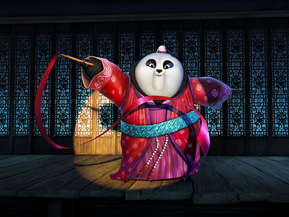Movie Review: Kung Fu Panda 3
By Matthew Huntley
February 3, 2016
BoxOfficeProphets.com

In my review of Kung Fu Panda 2, I mentioned that I hope the filmmakers extend the series into a trilogy, and it looks like directors Jennifer Yuh and Alessandro Carloni have done just that. And although this latest entry is lively, warm-hearted and tells a worthwhile story, I do think it’s time they retire Po and company. Kung Fu Panda 3 isn’t as cutting edge, funny or memorable as its predecessors, but it does allow the series to end on a high note, so the filmmakers should probably quit while they’re ahead.
This time around, Po’s kung fu skills are tested on a metaphysical level when he must learn to harness his inner chi, or the life force that flows through all living things. He’s told only a true chi master can defeat Kai (J.K. Simmons), an evil bull warrior who reignites a 500-year-old feud with Po’s grand master, Oogway (Randall Duk Kim), in hopes of becoming the sole ruler of the universe. Just before Kai steals Oogway’s chi, the latter tells him the Dragon Warrior will defeat him, and although Po has been told he is that warrior, it’s now something he must prove.
Meanwhile, Shifu (Dustin Hoffman) has just designated Po to be his successor as sensei to the Furious Five - Tigress (Angelina Jolie), Monkey (Jackie Chan), Mantis (Seth Rogen), Viper (Lucy Liu) and Crane (David Cross), although this isn’t a job he’s especially qualified to fulfill. Shifu informs Po that in order to be a good teacher he must find the answer to that all-important question each of us continuously asks ourselves, “Who am I?”
And if the pressures of being a teacher and world savior weren’t enough, Po also meets his biological father, Li Shan (Bryan Cranston), and is astonished to learn he’s not the last living panda on Earth after all. In fact, Li takes him to a secret village atop a faraway mountain where a whole community of pandas lives and thrives. For 20 years, Po always thought he was the last of his kind, and his adopted dad, Mr. Ping (James Hong), never told him otherwise because “Sometimes we do the wrong things for the right reasons.” It’s still a running joke that Po never questioned how he, a panda, could be the biological son of Mr. Ping, a goose (“Po still thinks he came from an egg.”).
Li tells Po he can teach him how to find his inner chi, although the truth to this remains in doubt when Li’s lessons include rolling down a hill, sleeping in past noon, and stuffing as many dumplings as possible into one’s mouth.
The screenplay by Jonathan Aibel and Glenn Berger, both of who contributed to the first two Kung Fu Panda scripts, is once again more thoughtful, patient and substantive than we expect given the nature of the movie. It’s deep in the sense that Po questions his own existence, purpose and self-worth, concepts the writers could have easily dumbed down or rushed through just to get to the action sequences, but the story takes its time and really shows Po struggling and learning. Add to that the series’ same irreverent humor and zippy action sequences that fully utilize the fluidity of computer animation, and the result is a good, wholesome family movie.
Perhaps the reason Kung Fu Panda 3 isn’t a great movie, however, is that it’s the third of its kind, and therefore it’s probably inevitable the story and characters can’t have the same impact they once had or generate the same level of excitement, rush and wit. That tends to happen when a franchise is no longer novel, which is why Kung Fu Panda 4 would likely be doing the series a disservice.
Nevertheless, as a third installment, Kung Fu Panda 3 delivers the goods. It’s inventive, beauteous, and jolly, and there are several occasions when it has us laughing out loud. And if we’re not laughing, we’re at least smiling. Call this (hopefully) final sequel a solid piece of entertainment without being a breakthrough, and although I wished it had either lived up to or exceeded the quality of its predecessors, I can understand why it didn’t. What remains evident is the filmmakers’ affection for the characters and their dilemmas, and it was this enthusiasm that gave the first two movies a lot more than our money’s worth, especially because they were marketed as silly, mainstream family fare. The third also gives us more than we bargained for, only not as much.